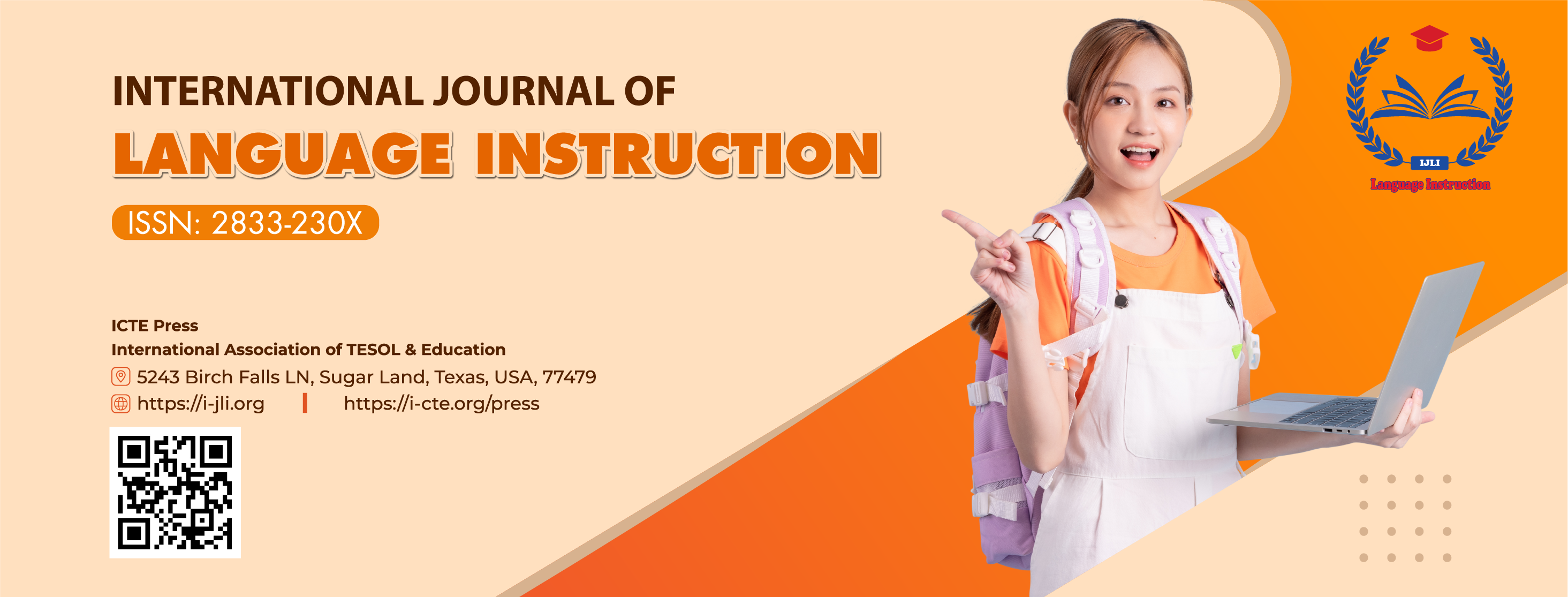The Effects of Task-Based Instructions on Secondary Students' Reading Performances
DOI:
https://doi.org/10.54855/ijli.22112Keywords:
Reading Comprehension, Task-based instructions, TaskAbstract
The study's goal is to cast light on the impacts of task-based instruction on the reading comprehension of EFL secondary students. The process was undertaken in a middle school in Kien Giang province in 2022. Reading pre-test and post-test data were first employed to gather research data from more than 70 students in a Secondary school. The post-tests were conducted after the pre-tests for five weeks. Then the data was converted into an excel version to be processed. Research results reveal that task-based instruction positively influenced learners' reading performances. The mean scores from the reading post-tests are relatively higher than those of the reading pre-tests. It can be inferred that students who participated in the treatment could improve their reading capability. Thus, having said that teachers used the TBI appropriately, they could scaffold their students' reading performance in particular and boost students' reading competency as a whole.References
Bojovic, M. (2010). Reading skills and reading comprehension in English for specific purposes. 23(9), 1–6.
Bygate, M., Skehan, P., & Swain, M. (2001). Researching pedagogic tasks: Second language learning, teaching, and testing. Routledge.
Dinh, H. M. T. (2022). Using TBLT Framework in Technology-mediated Environments to Enhance Students’ Vocabulary Retention and Interpreting Skills. International Journal of TESOL & Education, 2(2), 201–215.
Ellis, R. (2000). Task-based research and language pedagogy. Language Teaching Research, 4(3), 193–220.
Ellis, R. (2003). Task-based language learning and teaching. Oxford university press.
Ellis, R. (2009). Task‐based language teaching: Sorting out the misunderstandings. International Journal of Applied Linguistics, 19(3), 221–246.
Ellis, R. (2017). Task-based language teaching. In The Routledge handbook of instructed second language acquisition (pp. 108–125). Routledge.
Fraenkel, J. R., Wallen, N. E., & Hyun, H. H. (2012). How to design and evaluate research in education. McGraw-hill New York.
Hermida, J. (2009). The importance of teaching academic reading skills in first-year university courses. Available at SSRN 1419247. https://dx.doi.org/10.2139/ssrn.1419247
Howatt, A. P. R. (1984). A History of English Language Teaching. RELC Journal, 16(2), 279–413.
Iranmehr, A., Erfani, S. M., & Davari, H. (2011). Integrating task-based instruction as an alternative approach in teaching reading comprehension in English for special purposes. Theory and Practice in Language Studies, 1(2), 142–148. https://doi.org/10.4304/tpls.1.2.142-148
Khand, Z. (2004). Teaching reading skills: Problems and suggestions. Journal of Research (Faculty of Languages and Islamic Studies), 5, 43–56.
Klapper, J. (2003). Taking communication to task? A critical review of recent trends in language teaching. The Language Learning Journal, 27(1), 33–42. https://doi.org/10.1080/09571730385200061
Lap, T. Q., & Trang, H. D. (2017). The effect of Task-Based Learning on EFL students’ learning Reading: A Case study in the Mekong Delta of Vietnam. Studies in English Language Teaching, 5(1), 34–48.
Long, M. H. (1980). Input, interaction, and second language acquisition. University of California, Los Angeles.
Long, M. H. (1985). A role for instruction in second language acquisition: Task-based language teaching. Modelling and Assessing Second Language Acquisition, 18(1), 77–99.
Lunenburg, F., & Irby, B. (2008). Writing a Successful Thesis or Dissertation: Tips and Strategies for Students in the Social and Behavioral Sciences. https://doi.org/10.4135/9781483329659
Mao, Z. (2012). The application of task-based language teaching to English reading classroom. Theory & Practice in Language Studies, 2(11), 1–9.
Nguyen, T. T. N. (2022). The effects of task-based instruction on reading comprehension of non-English major students at a university in the Mekong Delta. International Journal of TESOL & Education, 2(4), 1–20. https://doi.org/10.54855/ijte.22241
Nunan, D. (2014). Designing and adapting materials to encourage learner autonomy. In Autonomy and independence in language learning (pp. 192–203). Routledge.
Okcu, D. (2015). Effects of task-based instruction on reading comprehension of Turkish EFL learners. International Journal of English Language Teaching, 3(2), 23–37.
Oxford, R. (2006). Task-Based Language Teaching and Learning: An Overview. Asian EFL Journal, 8 (3), 94-121
Poorahmadi, M. (2012). Investigating the efficiency of task-based instruction in improving reading comprehension ability. Journal of Language and Translation, 3(1), 29-36.
Prabhu, N. S. (1987). Second language pedagogy (Vol. 20). Oxford University Press Oxford.
Richards, J. C., & Rodgers, T. S. (1986). Approaches and methods in language teaching (3RD ed.). Cambridge university press.
Sholeh, M. B. (2020). Implementation of task-based learning in teaching English in Indonesia: Benefits and problems. Journal of English Teaching. Applied Linguistics and Literatures (JETALL), 4(2), 129–140.
Sidek, H. M. (2012). EFL reading instruction: Communicative task-based approach. International Journal of Instruction, 5(2), 20.
Skehan, P. (1998). A cognitive approach to language learning (Vol. 4). Oxford University Press.
Tilfarlioglu, F. Y., & Basaran, S. (2007). Enhancing reading comprehension through task-based writing activities: An experimental study. The Reading Matrix, 7(3), 134–152.
Vygotsky, L. S., & Cole, M. (1978). Mind in society: Development of higher psychological processes. Harvard university press.
Willis, J. (1996). A framework for task-based learning. Harlow, Essex, UK.
Downloads
Published
Issue
Section
License
Copyright (c) 2022 Tran Thi Thanh Nga

This work is licensed under a Creative Commons Attribution-NonCommercial 4.0 International License.
The copyright of all articles published in the International Journal of Language Instruction (ijli) remains with the Authors, i.e. Authors retain full ownership of their article. Permitted third-party reuse of the open access articles is defined by the applicable Creative Commons (CC) end-user license which is accepted by the Authors upon submission of their paper. All articles in the ijli are published under the CC BY-NC 4.0 license, meaning that end users can freely share an article (i.e. copy and redistribute the material in any medium or format) and adapt it (i.e. remix, transform and build upon the material) on the condition that proper attribution is given (i.e. appropriate credit, a link to the applicable license and an indication if any changes were made; all in such a way that does not suggest that the licensor endorses the user or the use) and the material is only used for non-commercial purposes.
Authors are able to enter into separate, additional contractual arrangements for the non-exclusive distribution of the journal's published version of the work (e.g., post it to an institutional repository, in a journal or publish it in a book), with an acknowledgment of its initial publication in this journal.











